Докладная записка Я. Петерса "Басмаческое движение в Средней Азии и борьба с ним". “The Basmachi Movement in Central Asia and the Struggle Against It.” Memorandum from Yakov Peters
Transcription
<<l.67>>
<<Печать Бюро Секретариата ЦК РКП(б). Дата 29/VI 22 Вх. No 7612/с>>
В ЦК РКП
Копия ГПУ и . . .
От члена РКП, Начальника Восточного отдела ГПУ
Петерса
Докладная записка.
Басмаческое движение в Средней Азии и борьба с ним.
Я не стану в своей докладной записке останавливаться на истории басмачества в Средней Азии, на экономических и политический причинах этого движения: они подробно и неоднократно излагались в моих докладах и докладных записках органам к которым я обращаюсь с настоящей докладной запиской. Особенно подробно они изложены в моем докладе “Басмачество и причины задерживающие его ликвидацию” от 20 октября 1921 года и в докладной записке “О политическом и военном состоянии Туркестана” от февраля 1922 года.
Цель моей докладной записки изложить настоящее положение Басмаческого движения в Средней Азии, ошибки, допущенные нами в борьбе с Басмачеством и мое мнение какие необходимо принять военные и чекистские мероприятия для успешной его ликвидации.
Басмаческое движение сейчас охватило всю Среднюю Азию, а именно Бухару, Хиву и Туркестан (при реальной поддержке Афганистана).
В Бухаре Басмачество из Восточной Бухары перекинулось на Западную до самых ворот гор. Старой Бухары, но будучи под Бухарой разгромлено нашими Красноармейскими частями оно отхлынул и на Западе сосредоточилось в районе Кермине под руководством Курбаши Сеид Ниязова и бывш. военного назира Арифова. Мелкие шайки заняли район Северо-Западные Чаржуя и Севернее Старой Бухары. Главные же силы Басмачества сосредоточены в Восточной Бухаре в районах: Байсун, Гизар, Карши, Дюшамбе [Душанбе], но главным образом в районе Байсуна, где Энвер Паша находясь во главе всех Басмаческих частей Средней Азии проводит энергичную военную подготовку и обучение отрядов способам полевой войны. Энвер Паша по полученным сведениям получает оружие из Афганистана, а тот в свою очередь от англичан. Что касается помощи людьми, то до сих пор установлено, что среди убитых басмачей были афганские граждане; по всей вероятности афганцы посылают в помощь Энверу своих солдат переодетыми.
В Восточной Бухаре наша агентурная работа поставлена весьма плохо, но по имеющимся данным из нескольких источников под командой Энвера по всей Бухаре имеется 24000 Басмачей. Из этого числа необходимо
<<l.68>>
откинуть половину как вовсе невооруженных и 4 тысячи туркмен в районе Керки-Мазар Шериф, которые находятся пока в сравнительно пассивном положении, производя только неорганизованные налеты на нашу приграничную полосу и угрожая нашему пароходному сообщению по Аму-Дарье между Чарджуем и Тамрезом. Если операция 1-го июня, намеченная против Энвера, для наших частей будет удачная, то фетиш Энвера рассосется и туркмены могут быть при умелом использовании превращены в оружие против Энвера.
Афганцы сейчас делают все чтобы упомянутых туркмен настроить против Бух[арской] сов[етской] власти, го в самом Афганистане туркменам живется чересчур не сладко, и посторяю, при более или менее умелом использовании они могут легко быть нами использованы.
Басмачество или верне для Бухары антисоветское движение в Бухаре так же ново, как сама советская власть. Особенно Восточная Бухара советского строительства не видела. После “революции” в Бухаре, Восточная Бухара была местом бедствия бывшего Эмира и армии его чиновников, которые после бегства Эмира в Афганистан остались в Восточной Бухаре, разошлись по кишлакам и шесть месяцев не наказанно продолжали эмирскую работу. Советская же власть там пришла на плечах нашей Красной Армии и была очень плохим образцом советских порядков, о чем опять-таки неоднократно писалось.
К этому еще необходимо прибавить ряд нелепостей в экономических и политических взаимоотношениях с Бухарой, которые уже учло Политбюро и вынесло по этому вопросу соответствующее постановление.
Так что, принимая все это во внимание, и если принятые Политбюро постановления об открытии бухарской границы для свободного товарообмена дадут возможность реализовать каракуль если не в России, то на внешнем рынке, и если с другой стороны операции намеченные в Восточной Бухаре Штабом Бухарской группы войск в июне пройдут действительно без насилия над мирными жителями координированными действиями -- военными, политической агитации и экономическими мероприятиями и если будут приняты срочные меры по окончании постройки Каршинской жел[езно] дор[ожной] ветки, которые должны связать изолированную Восточную Бухару с российским и бухарским рынком, то несмотря на то, какую тактику примет Энвер Паша после июньского удара -- отступит ли на афганскую территорию или примет тактику ферганских Басмачей, он все равно потеряет базу для своей авантюры.
Усталая масса декхан разойдется, приступит к мирному труду, тем
<<l.69>>
более, что урожай в этом году в Бухаре небывало хороший. Создание специальной группы войск в Бухаре с Реввоенсоветом в коротый входит представитель Бух[арских] властей, настроение бухарцев не заигрывать с Басмачами, дают надежду на успех ликвидации Басмаческого движения в Бухаре.
Басмаческое движение в Туркестане.
Совершенно другую картину из себя представляет Басмаческое движение в Туркестане. Возникло оно в Фергане в момент глубокого экономического и политического произвола отдельных лиц и групп и прережила разных стадий в своем росте и развитии. На них я останавливаться не буду, об них очень много писалось.
Сейчас Басмаческое движение в Туркестане охватило Ферганскую область всю, в количестве 10 тысяч, почти все и довольно хорошо вооружены, Самаркандскую область главным образом Педжикейтский уезд и вокруг города Самарканда в количестве приблизительно 800 чел. и усилилось оно около Ташкента на Облыкаском фронте. Вместе с тем, Басмаческое движение в Туркестане изменилось и в своем характере. После ликвидации отголосков Кокандского автономного движения с весны 1920 года до приблизительно осени 1921 года Басмаческое движение в Фергане было совершенно изолированно от населения [и] несло чисто бандитский характер. Оно не пользовалось поддержкой населения и если иногда население оказывало содействие Басмачам, то исключительно и за страх: ибо расправа со стороны Басмачей по отношению тех, кто хотя немного помогал нашим войсковым частям переходила все границы свирепости. Даже бывш[ий] Зам[еститель] Председателя Турк[естанского] ЦИКа Дженизаков, который бежал к Басмачам, в своем докладе должен был признаться, что “Ферганских Басмачей нельзя объединить вокруг политических лозунгов”. Хотя Курширмат, бывший катрожник, называл себя командующим всеми мусульманскими войсками Ферганской области, он оставался настоящим уголовным каторжником и идейно изолированным от населения; опираясь исключительно на элемент, разоренный благодаря экономической катастрофы и своей свирепости.
Но то, что не мог сделать Дженизаков, то есть объединять Басмачей вокруг политических лозунгов, то сделали мы сами. Когда летом 1921 года против Басмачей в Фергане были приняты более или менее радикальные военные меры, наши войсковые части стали их успешно бить, среди населения тоже появилась решительность против грабителей. Были даже случаи когда население нападало или отбивалось камнями от них. Как раз в это время басмачи стали пойти на мирные переговоры с сов[етской]
<<l.70>>
властью. Обсудив это предложение мы решили вести мирные переговоры исключительно под условием чтобы басмачи сдадут все оружие. Но товарищи так увлеклись предложение мира, что в Фергану на мирные переговоры поехали не только высшие представители Туркестанской власти, но даже тов. Йоффе. Басмачи оказали им высокую честь при прощании по местному обычаю гостей богато одарили: кому халат, кому верховую лошадь, кому корову с теленком. Все это было в карикатурном виде. С тех пор мирные переговоры не прекращались, но все безуспешно. С мирных переговоров басмачи выиграли много, ибо население смотрело на это, что Сов[етская] власть относится к басмачам как равным и так мы сами создали им больше авторитета в глазах населения.
Тем более, что в руках басмачей все кишлачное население и они широко использовали мирные переговоры для агитационных целей, в то время как мы обладали исключительно городами и агитация ограничилась двумя-тремя митингами. С тех пор басмачество стало принимать все более политическую физиономию, с появлением Энвера они приобрели главногомандующего и определенные политические лозунги. Сейчас даже с Самаркандской области авторитет басмачей вырос до того, что население само проводит для них военную повинность, мобилизуя из каждого кишлака определенное число джигитов для ближайшего курбаши. А басмачество разорив Ферганскую область перебрасывает свои силы на Самаркандскую и эти две лучшие, самые богатые области не только Туркестана но и пожалуй всей России разрушены и разрушаются бандитским движением, которому мы сами придали политическую физиономию и подняли их авторитет в глазах населения.
Основные ошибки в борьбе с басмачеством.
Здесь опять-таки я не могу останавливаться, но ошибки допущенные нами [в] политической и особенно экономической области по той же причине, что я их освещал в каждом своем докладе, но так как я считаю что в борьбе с басмачеством необходимо координированных действий: экономических, политических и военно-чекистских, то я здесь исключительно коснусь ошибок допущенных военно-чекистских.
<<l.71>>
1) Основная ошибка в борьбе с басмачеством, что она поставлена так, что никто за нее не несет ответственность. Военное командование всецело подчинено Турк[естанскому] Бюро в этом вопросе. Туркбюро так часто меняется, что никогда не может учесть результатов своих опытов и благодаря этому получилось, что те ошибки, которые проделывались в одном составе Туркбюро и очень болезненно отзывались на ликвидации басмаческого движения, пунктуально повторялось следующим составом, а мусульманские же товарищи во всякой крупной и сложной работе настолько неопытны, что они эти ошибки учесть никак не могут.
2) Колебание от военной диктатуры к вмешательству гражданских органов в оперативные планы имело место в [19]20 г. в Фергане, когда там существовала военная диктатура. Реввоенсоветы и командиры войсковы частей приказывали Ревкомам--потом пошла новая политика и опять перегибали палку до того, что командовать частями стали чуть ли не уезд[ные] ком[итеты]. Нередко оперативные планы обсуждались в обкомах и уездкомах.
3) Неумение использовать местное население в борьбе с басмачеством. В начале борьбы с басмачеством местное население совершенно не привлекалось. Наши войсковые части, пехота, кавалерия, артиллерия вплоть до тяжелой проходили кишлаки, население разбегалось, рассеивалось и басмачи, превращаясь в мирные жители, а как только наши части ушли из виду, население [и] басмачи появлялись снова, находили разграбленные квартиры, иногда нашими красноармейчами, иногда басмачами, но все безобразия ставились в счет нашим красноармейцам. Упомянутое явление заставило поднять в 1921 г. вопрос о необходимости вовлечь в борьбе с басмачеством туземное население. Практиковалось главным образом тех у кого есть убитые со стороны басмачей и поэтому существует кровная вражда. Этих элементов необходимо было вовлечь в отрядах содействия нашим красноармейским частям, но благодаря постоянной лени и халатности мусульманских товарищей, которые каждую срочную и серьезную работу проваливают, эти отряды не были сформированы. А пошли по пути наименьшего сопротивления. Сперва решились формировать так называемый территориальный полк, а потом
<<l.72>>
без решения Туркбюро при содействии Теркулова были организованы два территориальных полка из перешедших басмачей. Оба эти полка получили хорошее оружие, один в целом ушел к басмачам, а другого удалось часть разоружить. Первый упомянутый полк снова перешел к нам и при сем прилагаю договор заключенный с Джанибековым, командиром упомянутого полка (см. приложение N 1 ) и по сообщению нашей агентуры Джанибеков сдал 100 негодных винтовок, остальные спрятал наверное [и] набравшись снова оружия уйдет против нас. Вместе с этим прилагаю список сколько таких формированных мусульманских отрядов перешли к басмачам и унесли оружие (см. приложение N 2* ). <<На полях надпись: “1) Не приложено”>> Серьезно с тем, чтобы среди формируемых мус[ульманских] частей поставить хорошую политработу и одеть и накормить не брались, а повторяю шли по линии наименьшего спротивления, вооружали и обучали перешедших басмачей. Или вооружали без всякого толка население. Как в этом году до апреля в одной Фергане населению выдано 4000 тыс. винтовок (см. приложение N 3 ).
4) Отсутствие политической работы. Политическая работа в басмаческих районах совершенно не велась. Были неоднократно партмобилизации для Ферганы, но без всяких результатов. Так в августе 1921 г. по приезде Рудзутака, когда нас в Тюркбюро было большинство, решили принять серьезные меры по ликвидации басмачества в Фергане. Был туда послан т. Баранов, член ЦК КПТ в качестве командующего и направлены лучшие чекисты. Было также решено провести широкую партмобилизацию. Партмобилизация как всегда не удалась, вместо 150 партработников поехало 6 или 10 чел., которые тоже скоро вернулись.
5) Заигрывание с басмачами. Весной 1920 г. в Фергане была поставлена военная диктаторская тройка во глава Атабаева, человека чрезвычайно неподходящего и никогда не бывший на фронте, политически совершенно не развитый и по психологии нам совсем чужой. Атабаев катается в специальном поезде из Ферганы в Ташкент, а с басмачеством ведем мирные переговоры уже чуть ли не год, подымает их авторитет в глазах населения, дает им возможность вооружиться и [по] плану Энвера перегруппироваться.
<<l.73>>
6) Ошибки военного командования. Помимо упомянутых ошибок, т. е. переход от военной диктатуры к полному заигрыванию с басмачами, пассивному к нему отношению, постоянного их снабжению оружием через мус[ульманское] формирование и милицию, необходимо прибавить ошибочность тактики самого военного командования. Может заигрывание с басмачами не пошло так далеко если бы военное командование не потеряло бы всякий авторитет в глазах населения, не показало свою неспособность в течение 4-х лет борьбы с басмачеством в Фергане. Было время когда военное командование в Фергане имело достаточно войск, чтобы ее оккупировать, но военные операции происходили так безобразно, [что] басмачество от них не только не пострадало, но наоборот выиграло. В Фергане находилось в большом количестве никому не нужной артиллерии, вплоть до тяжелой, объедали население, ощущался голод, лошали пали, голодали красноармейцы и голодные продавали патроны басмачам совершенно свободно.
Военные операции в Фергане проходят по все правилам фронтового командования, совершенно не учитывается партизанский характер басмачества. Несмотря на то, что басмачи почти никогда не принимают бой за исключением если ои принуждены к этому, военное командоавание придерживается тактики организованного наступления, а не старались изменить тактику и дать возможность частям самим проявить инициативу. В результате такой тактики есть--загоняют лошадей и людей, а басмачи рассеиваются кишлаками среди мирного населения и снова появляются в тылу и операции начинаются с изнова. Летом [19]21 г. мною было предложено военному командованию распределить и прикрепить все войсковые части в Фергане к определенным районам и дать им самостоятельную инициативу. В то же время была усиленная агентурная работа в басмаческих районах в Фергане. Происходила регистрация активных басмачей и идейных вдохновителей басмачества и в Андижанском районе произведен опыт, т.е. в кишлаках, где уже нашими агентами была призведена регистрация, произвели операции с весьма хорошим результатом: найдено много оружия и др[угих] вещей. Но военное командование, которое вначале к моему проекту отнеслось сочувственно, заявило, что это есть и их план,
<<l.74>>
после довело его осуществление на нет. Началась старая тактика прогулок и безрезультатного наступления. Потом началась борьба за мусульманизацию органов Ч.К. [и] вместе с этим уничтожена была сама агентура и регистрация.
О басмачестве в Хиве и Туркменской области говорить не стану, потому, что считаю, что басмаческое движение серьезной роли не играет и не может играть.
Какие необходимо принять меры для успешной борьбы с басмачеством.
1) Возложить всю ответственность борьбы с басмачеством на военное командование.
2) Устранить от вмешательства в делах командования гражданских властей и лиц, создать Реввоенсовет с введением туда одного представителя от местных гражданских властей.
3) Изъять мирные переговоры с басмачами от гражданских властей и оставить это всецело в руках военного командования. Поставить определенный срок и условаия этим переговорам--непременной сдачи оружия.
4) Прекратить му[сульманское] формирование, особенно в Фергане и при формировании милиции серьезно проверить личный состав милиции.
5) Обратить сугубое внимание на хранение оружия и учета патронов.
6) Отозвать из Ферганы председателя Турксовнаркома Атабаева и Хадыр-Алиева, как только мешающих работе.
7) Произвести основательную чистку партии в Фергане вплоть до ее распущения и нового набора.
8) Перестроить тактику военного командования в Фергане в соответствии моим указаниям (см. стран[ицу] 7 этой докладной записки).
9) Основательно переформировать органы ГПУ в Туркестане -- назначением во главе таковых исключительно опытных чекистов с соответствующим партийным стажем.
Начальник Восточного отдела ГПУ:
Петерс
15 июня с[его] г[ода].
Translation
<<l.67>>
<<stamp of the Bureau of the Secretariat of the Central Committee of the Russian Communist Party (Bolshevik): Date: 29/VI-[19]22. Incoming No. 7612/e>>
<<handwritten on the margin: No. 123 (25) / 2 >>
To the TSK RKP [Central Committee of the Russian Communist Party]
Copy to the GPU [State Political Directorate] and . . .
From RKP member, Head of the Eastern Department of the GPU, [Yakov] Peters.
Memorandum.
The Basmachi Movement in Central Asia and the Struggle Against It.
In my memorandum I will not dwell on the history of the Basmachi movement in Central Asia or the economic and political reasons for the formation of this movement: Those things have been detailed in great length and on many occasions in my previous reports and memoranda to the organs to which I am directing this message. They are set out in particular detail in my report titled “The Basmachi movement and the reasons stalling its liquidation” from 20 October 1921 and the memorandum “Regarding the political and military situation in Turkestan” from February of 1922.
The purpose of my memorandum is to set forth the current state of the Basmachi movement in Central Asia, the mistakes we made in the struggle against the Basmachi and my opinion regarding the military and Chekist[1] measures we need to take to ensure the movement's successful liquidation.
The Basmachi movement now envelops all of Central Asia, particularly Bukhara, Khiva and Turkestan (with real support from Afghanistan).
In Bukhara, the Basmachi movement has spread from East Bukhara to the west all the way to the gates of Old Bukhara, but south of Bukhara it was smashed by our Red Army forces and retreated to the west, concentrated in the Kermin region under the leadership of Kurbashi[2] Seid Niyazov and military veteran Nazir Arifov. Small groups occupied a region northwest of Charzhuy[3] and the northern part of Old Bukhara. The main forces of the Basmachi are concentrated in Eastern Bukhara in the regions Boysun, Gizar, Karshi and Dushanbe, but primarily in the region of Boysun, where Enver Pasha,[4] being at the head of all the Basmachi units in Central Asia, conducts energetic military preparations and training of units in different field tactics. According to the information we have gathered, Enver Pasha receives weapons from Afghanistan, where they are in turn shipped from England. When it comes to the people aiding them, at this point it has been established that Afghan citizens were among the Basmachi who were killed there; it is almost certain that the Afghans are sending disguised soldiers to help Enver.
In eastern Bukhara, our intelligence work is rather poorly positioned, but according to the information we have from a number of sources, there are 24000 Basmachi under Enver’s command across Bukhara. From that number we should
<<l.68>>
subtract half, as they are entirely unarmed, and 4 thousands Turkmen in the Kerki-Mazar Sherif region, who are in a relatively passive position at the moment, and conduct nothing more than unorganized raids on our border and threatening our marine communications on the Amu-Daria [river] between Chardzhuy and Termez. If the June 1 operation[5] we have planned against Enver is successful, Enver’s cultish following will be dissolved and the Turkmen can be turned into a weapon against Enver.
The Afghans are currently doing everything they can to turn the Turkmen against the Bukhara Soviet power, but in Afghanistan itself the Turkmen have a very difficult life, and I repeat, with more or less clever planning they can easily be used by us.
The Basmachi, or, more accurately for Bukhara, the anti-Soviet movement in Bukhara are as new as Soviet power itself. Particularly Eastern Bukhara has not experienced Soviet construction. After the “revolution” in Bukhara, Eastern Bukhara was a place of disaster for the former Emir and his functionaries’ army, who remained in east Bukhara after the escape of the Emir to Afghanistan, were separated into kishlaks[6] and spent 6 months at unpunished work for the Emir.[7] Soviet power came there on the shoulders of our Red Army and was a very poor example of Soviet order, which, I repeat, has been written about on multiple occasions.
To this we must add the series of absurdities in our economic and political relations with Bukhara, which the Politburo has already noted and passed a resolution on.
So, taking all of this into consideration, if the resolutions passed by the Politburo regarding the opening of the Bukharan border for free trade relations will give us an opportunity to sell karakul if not in Russia, then on the external market; and if, on the other hand, the operations planned in east Bukhara by the headquarters of the Bukharan forces in June will take place without violence against peaceful civilians and with coordinated actions -- military, political agitation and economic measures; and if we take emergency measures to finish the construction of the Karshinskaya railroad, which should tie the isolated east Bukhara to Russia and the Bukharan market; then no matter what tactic Enver Pasha chooses after the June assault -- whether he moves back to Afghan territories or chooses the tactic of the Fergan Basmachi, he will still lose the base for his adventurism.
The tired mass of dekhans will dissipate, join peaceful workers,
<<l.69>>
especially since the harvest this year in Bukhara is unusually good. The creation of a special group of military units in Bukhara with a Revolutionary Military Council, a seat on which is occupied by a representative of the Bukhara government, discouraging the Bukhara people from working with the Basmachi, all gives hope for a successful liquidation of the Basmachi movement in Bukhara.
The Basmachi Movement in Turkestan
The Basmachi movement in Turkestan presents an entirely different picture. It arose in Fergana during a time of deep economic crisis and political arbitrariness among a few individuals and groups and went through a number of different stages in its growth and development. I won’t go into those -- there has been a great deal written about them already.
Currently the Basmachi movement in Turkestan has taken over the Fergana province, 10 thousand people, almost all of them pretty well-armed; the Samarkand province -- primarily the Penjikent region and around the city of Samarkand, approximately 800 people, and it has been strengthened around Tashkent on the Oblykask front. Additionally the Basmachi movement in Turkestan has changed in its character. After the liquidation of the remnants of the Kokand autonomous movement[8] from the spring of 1920 to approximately the fall of 1921, the Basmachi movement in Fergana was entirely isolated from the population and had a character of pure banditry. It had no support from the people, and if the people occasionally offered the Basmachi help, then only due to fear, because the Basmachi’s revenge against those who aided our military units even in the slightest bit crossed all boundaries of savagery. Even the former deputy chair of the Turkmen TsIK,[9] Dzhenizakov, who fled and joined the Basmachi, had to admit in his report that “the Fergana Basmachi cannot be united under political slogans”. Although Kurshimat,[10] a former convict, called himself the commander of all the Muslim units in the Fergana province, he remained a real criminal and ideologically isolated from the population, relying entirely on the economic catastrophe and his own ruthlessness.
But everything Dzhenizakov failed to do -- unite the Basmachi around political slogans -- we did ourselves. When in the summer of 1921 we attacked the Basmachi in Fergana by more or less radical military means, our military units began successfully beating them. The population also adopted a decisive position against the bandits. There were even instances when the people attacked them or defended themselves with rocks. It was during this time that the Basmachi decided to attempt peace talks with Soviet
<<l.70>>
power. After discussing their proposal, we agreed to peace talks -- solely under the condition that the Basmachi give up all their weapons. But the comrades became so taken by the peace proposal that it was not only representatives of Turkestani power, but even Comrade Ioffe[11] that came to Fergana for the peace talks. The Basmachi honored them by giving them parting gifts in accordance with local tradition: some got robes, others got horses, others got cows and calves. All of this was very much in a grotesque form. Since then the peace talks have not stopped, but all to no avail. The Basmachi won much from those peace talks, because the people saw Soviet power dealing with the Basmachi as equals, and in that way we created more authority for them in the eyes of the people.
Moreover, the entire kishlak population is in the hands of the Basmachi, and they used peace talks widely for agitational ends, while we only had control over cities, and our agitation was limited to two or three demonstrations. Since then, the Basmachi movement began to take on an increasingly political face; with the emergence of Enver they gained a commander and developed specific political slogans. Today even in the Samarkand province the authority of the Basmachi has grown to the point where the people are voluntarily joining their forces, mobilizing a number of dzhigits[12] from each kishlak for the nearest kurbashi. And after ravaging the Fergana province, the Basmachi are moving their forces to Samarkand, and these two of the most excellent, resource-rich regions not only in Turkestan, but in all of Russia, are being continuously destroyed by a bandit movement, which now has a political face and elevated authority in the eyes of the people -- all thanks to us.
The Main Mistakes in the Struggle Against Basmachi
Here, again, I cannot linger for too long on our mistakes in the political and, especially, economic sphere for the reason that I have illuminated them in each of my [previous] reports; and since I am convinced that the struggle against Basmachi calls for coordinated economic, political, and military-Chekist actions, here I will touch exclusively upon the military-Chekist mistakes that we have made.
<<l.71>>
1. The main mistake in our struggle against Basmachi is that it has been organized in such a way that no one bears responsibility for it. The military leadership is fully subordinate to the Turkestan Bureau on this issue. The Turkestan Bureau [composition] is changing so often that it cannot learn from its own experience. As a result, the new members of the Turkestan Bureau make exactly the same mistakes as the previous members had made, and that negatively affects the effort to liquidate the Basmachi. At the same time, the Muslim comrades are so inexperienced in conducting any large or complex work that they do not know how to learn from those mistakes.
2. The shift from military dictatorship to [allowing] interference from civil organs [of government] into operational plans occurred in [19]20 in Fergana during the military dictatorship there. [First,] revolutionary military councils and commanders of military units issued orders to the revolutionary committees. Then a new policy was put in place, and all went to the other extreme, when even the district committees gave orders to the military units. Often, operational plans were discussed in provincial and district committees.
3. Inability to use the local population in the struggle against the Basmachi movement: In the early days of the struggle with the Basmachi movement, the local population was completely uninvolved. Our military units, infantry, cavalry, artillery, including heavy artillery, passed through the kishlaks; the people fled and dispersed, and the Basmachi turned into peaceful residents. As soon as our units were out of sight, the villagers and Basmachi would reappear. They found dwellings pillaged, some by our Red Army men, some by the Basmachi, but all the disgrace was blamed on our Red Army men. In 1921, this led to the discussion of the need to involve the native population in the struggle against Basmachi. The practice was [to approach] mostly those who had relatives killed by the Basmachi, and could therefore have blood to avenge. These individuals were to form detachments to support our Red Army units. However, due to the perennial laziness and complacency of our Muslim comrades, who have failed at all urgent and serious work, these detachments were never formed. Instead, they took the path of the least resistance. At first, they decided to create a so-called territorial regiment.
<<l.72>>
After that, without the Turkestan Bureau’s approval and with support from Terkulov, they organized two territorial regiments composed of Basmachi who had switched sides. Both regiments were equipped with good weapons. One fully defected to the Basmachi. The other we managed to partially disarm. The first regiment later returned to our side. I am attaching an agreement with their regiment commander, Dzhanibekov (see Attachment No. . . .).[13] Our agents reported that Dzhanibekov turned in 100 defective rifles. He probably stashed the rest somewhere and, after getting more arms, will turn against us once more. I have attached a list of such Muslim detachments that defected with weapons to the Basmachi (see Attachment No. 2 *). <<Note in the margins: 1) No attachment>> Nobody seriously addressed the need to conduct solid political work with the new Muslim units, to feed and equip them. As I said, they took the course of least resistance and armed and trained the Basmachi turncoats. Or, they senselessly distributed arms among the population. This year through April, in Fergana alone, they issued around 4000 thousand rifles[14] to the population (See Attachment No. 3).
4) Lack of political work: There was absolutely no political work conducted in the Basmachi regions. There were multiple party mobilization campaigns in Fergana, but with no results. Thus, in August 1921, after the arrival of Rudzutak[15] and when we had a majority in the Turkestan Bureau, we decided to take serious measures to liquidate the Basmachi movement in Fergana. We sent a member of the Central Committee of the Communist Party of Turkestan, comrade Baranov, as a commander, and some of the best Chekists. We also decided to conduct a broad party mobilization. As usual, the party mobilization was unsuccessful. Instead of 150 party workers, only six or ten went there, and those soon returned.
5) Overtures to the Basmachi: In spring 1920, a dictatorial troika with Atabaev as the leader was appointed in Fergana. [Atabaev was] a wholly unfitting person. He was never at the front, politically immature, and alien in his way of thinking. Atabaev is riding back and forth in a special train between Fergana and Tashkent and has been conducting peace talks with the Basmachi for almost a year now. By doing so he raises their prestige in the eyes of the population and allows them to arm and regroup [in accordance with] Enver’s plan.
<<l.73>>
6) Mistakes made by the military leadership: Besides the aforementioned mistakes, such as wavering between military dictatorship and overtures to the Basmachi, passivity in the face of the Basmachi movement and supplying them with arms via the Muslim detachments and the police, it is necessary to add the tactical mistakes of the military leadership itself. It is possible that the overtures with the Basmachi would not have gone so far had the military leadership not lost all authority in the eyes of the population and not demonstrated its total incompetence during the four years of struggle against the Basmachi in Fergana. There was a time when the military leaders had sufficient troops in Fergana to occupy it. However, the military operations were conducted in such an abominable way that the Basmachi gained more than they lost more from them. A large amount of unnecessary artillery, including heavy artillery, was stationed in Fergana. The population was robbed, there was starvation, horses were dying off, and hungry Red Army men openly sold ammunition to the Basmachi.
The military operations in Fergana are conducted according to the standard rules of engagement, without taking into consideration the guerrilla character of the Basmachi movement. Despite the fact that Basmachi almost never accept battle unless forced to, the military commanders stick to tactics of the organized offensive without trying to adjust it and letting individual units take the initiative. As a result of such tactics, men and horses get exhausted while the Basmachi disperse in the kishlaks among the local population, only to reappear in the rear, and the operation starts again from scratch. In the summer of 1921, I proposed to the military commanders to allocate and assign all the military units in Fergana to particular districts, and allow them more independence and initiative. At the same time, we strengthened our agent network in the Basmachi districts in Fergana. We registered active Basmachi and their ideological leaders. In the Andizhan district we tested [the new tactics]: in the kishlaks where our agents had already performed a registration, we conducted operations with fairly good results, discovering a lot of weapons and other things. However, the military leaders, who had initially supported my project, declared that it was their plan too,
<<l.74>>
and eventually knocked the legs out from under it. They reverted to the old tactics of strolling about and futile offensives. Later came the struggle for Muslimization of the Cheka organs and as a result the agent network itself was destroyed along with the registration [initiative].
I am not going to discuss the Basmachi movement in Khiva and the Turkmen province because I think that the movement there does not play any serious role, and does not have the capacity to do so.
Necessary Measures to Successfully Fight the Basmachi Movement.
1. Make the military leadership fully responsible for the struggle against the Basmachi.
2. Prevent the civil authorities and individuals from interfering with the business of military command; establish a Revolutionary military council with a representative from the local civil authorities.
3. Prevent civil authorities from conducting peace talks with the Basmachi and leave this business entirely in the hands of the military leadership. Establish a firm deadline and conditions for these negotiations: mandatory disarmament.
4. Suspend the formation of the Muslim detachments, especially in Fergana, and thoroughly review members of the police force during its creation.
5. Pay special attention to the custody of weapons and ammunition count.
6. Recall chairman of the Turkestan Soviet of People’s Commissars Atabaev and Khadyr-Aliev from Fergana as individuals who are only hindering our work.
7. Conduct a thorough purge of the Fergana party organization, to the point of its dissolution and new recruitment.
8. Restructure the military command tactics in Fergana according to my instructions (see p. 7 of this memorandum).
9. Thoroughly restructure the GPU organs in Turkestan by appointing exceptionally experienced Chekists with appropriate party experience to leadership positions.
Head of the Eastern Department of the GPU: Peters
15 June of this year.
[1]Chekist--refers to VChK, the All-Russian Extraordinary Commission for Combating Counter-Revolution and Sabotage, one of the names for the Soviet secret police.
[2] Kurbashi--military leader, field commander.
[3] Chardzhuy (now Turkmenabat)--city in Turkmenistan.
[4] Ismail Enver Pasha was a political and military leader in the Ottoman empire and one of the leaders of the Young Turk revolution, and an ideologue of Pan-Turkism. A War minister during World War I, he was dismissed after the defeats in the Caucasus, he went to exile in Germany, and later to Russia. Soviet leaders thought that his popularity might be helpful in the struggle against Basmachi, and sent him to Turkestan in 1921. Very soon he switched sides and became the most prominent leader of the Basmachi movement while also trying to realize his Pan-Turkic ideas. He was killed in battle on 4 August 1922. After that, the Basmachi movement never regained its strength and was fully suppressed within a few years.
[5] In June 1922, after the collapse of peace talks with Enver Pasha, the Red Army launched a large-scale offensive. In a series of battles, the Basmachi forces were defeated and dispersed, and the Red Army captured Dushanbe and other key cities.
[6] Kishlak--a village, rural settlement.
[7] In September 1920, the Red Army, supported by the Young Bukharans, stormed and occupied Bukhara after heavy fighting. The Bolsheviks and Young Bukharans organized an All-Bukharan Revolutionary Committee, and in October proclaimed the Bukharan People's Soviet Republic. Bukharan Emir Alim Khan fled to Eastern Bukhara and later Afghanistan from where he continued to lead and inspire the basmachi resistance.
[8] The Kokand (Turkestan) Autonomy existed between November 1917 and February 1918 on the territory of the former Turkestan general governorship (modern Uzbekistan, Kazakhstan, and Kyrgyzstan). It was defeated by the Red Army after refusing to accept a Soviet ultimatum. The operation, in which a large number of civilians were killed, set the stage for powerful local resistance and the Basmachi movement.
[9] Central Executive Committee.
[10] Kurshermat (Sher Mukhammad-bek), one of the top Basmachi leaders in Fergana in 1920-21.
[11] Adolf Abramovich Ioffe, a Bolshevik revolutionary and Soviet diplomat. In 1921 he was chairman of the Turkestan Commission of the VTsIK and Council of People’s Commissars, and a member of the Turkestan Bureau of the Central Committee.
[12] Dzhigit--a brave warrior, horseman in Central Asia and the Caucasus.
[13] No attachments found in the file.
[14] Probably, 4,000 rifles.
[15] Jan Rudzutak was a Bolshevik revolutionary, a Politburo member, and the secretary general of the Central Council of Labor Unions. In the 1920s he was chairman of Turkestan Bureau of the Central Committee, and the Turkestan Commission of the VtSIK.
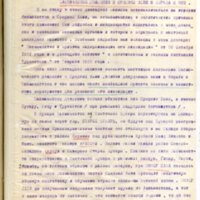
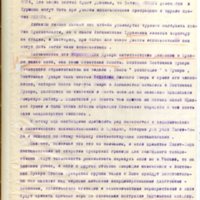
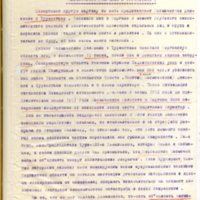
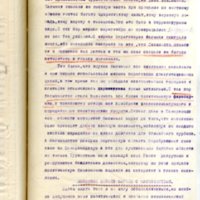
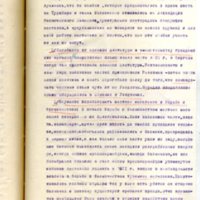
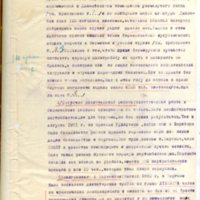
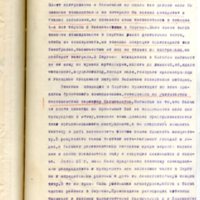
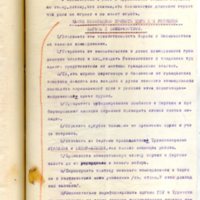
Comments